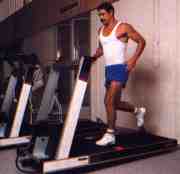|
There are many methods of keeping fit, but none are as important as
aerobic fitness.

Benefits of aerobic exercise
- Increased heart efficiency
- Increased lung efficiency
- Reduction in body fat
- Reduction in cholesterol
- Release of stress and tension
1 Heart efficiency
The Heart is a muscle which, like all other muscles, thrives on physical
activity. It grows stronger with the right kind of exercise and weaker without
it. A strong, trained heart can get more oxygen-carrying blood to your
other muscles by beating faster and more powerfully. Muscles require oxygen to
work and if they do not receive enough they quickly become tired. The ability of
your heart to pump blood is critically important during exercise especially, if
the activity is sustained.
2 Lung efficiency
Aerobic exercise increases the efficiency of your lungs and also strengthens
the muscles that make the lungs expand and contract. Oxygen is collected by the
blood as it passes through the lungs, and then carried to the working muscles.
If your lungs are not healthy (for example, due to smoking) oxygen cannot be
collected efficiently, reducing your ability to exercise for long periods.
3 Reduction in body fat
Many people are overweight through a lack of exercise, and obesity is a major
coronary factor because it imposes extra work on your heart.. Regular aerobic
exercise at a moderate intensity increases the rate at which you burn up
calories, which results in a lower percentage of body fat. This can be achieved
through a regular programme of aerobic activity lasting 20-30 minutes, three to
five times a week.
4 Reduction in cholesterol
If you do not take regular exercise your body is more likely to produce more
low density lipoprotein (LDL) cholesterol, which leads eventually to heart
disease. Physically active people appear to produce more of the higher-density
lipoprotein (HDL) cholesterol, which scavenges the LDL "bad"
cholesterol and transports it to your liver for disposal. Studies show that to
produce a high level of HDL you need to jog at least 15 miles per week.
5 Release of stress and tension
High levels of stress are strongly linked with unnecessary tiredness, illness
and premature heart disease. If you are highly tensed your body becomes
chemically out of balance through the increase in stress hormones such as
adrenalin. Aerobic exercise is nature's tranquillizer, and by re-distributing
the stress hormones it brings the mind and body closer together for a natural
feeling of well-being.
 Swimming is a
good aerobic exercise although, unlike this Royal Marine, you do not have to do
it with a belt full of weights and a rifle. Swimming is a
good aerobic exercise although, unlike this Royal Marine, you do not have to do
it with a belt full of weights and a rifle.
The principles of aerobic exercise
1 Frequency
Beginners should work out aerobically 2-3 times a week, building up to 4-5
times a week for peak fitness.
2 Intensity
You should exercise hard enough to increase heart and breathing activity to
between 60 and 80% of maximum capacity. Lower than 60% does not provide good
training effect unless you are monstrously unfit. Higher than 80% takes you into
anaerobic ("without oxygen") exercise, which you will not be able to
maintain for long periods.
3 Duration
To get the full benefits of aerobic exercise you will need at least 20
minutes of moderate/high intensity activity. This should increase to 30-45
minutes if you are very fit, and 45-60 minutes when you are at peak fitness.
4 Type of activity
The most effective effective activities are high intensity exercises
including running, jogging, swimming, cycling and cross-country skiing. These
activities place the necessary demands on your body and train your vital aerobic
systems.
|